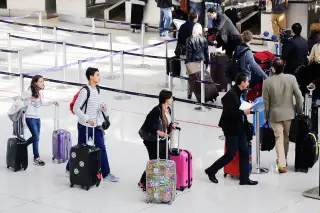New Bill Could Cap Airline Checked Baggage Fees at $4.50

On Wednesday, Congressman John Mica (R-FL) introduced legislation into the House that would severely limit how much airlines can charge passengers for checking baggage on flights.
The airline industry collected a whopping $38 billion in fees last year, with checked baggage charges—which are typically $25 and up for a service that was included in the cost of a ticket not long ago—providing a big chunk of that revenue. Mica's bill, however, would cap the cost of checking a piece of luggage on a flight at just $4.50.
Or more specifically, the bill would mandate that airlines "may not collect from a passenger a fee for an item of checked baggage on a flight in passenger air transportation if the amount of the fee exceeds the total amount of passenger facility charges that could be imposed."
A passenger facility charge (or PFC) is the fee that airports can tack on each time a flier travels through an airport. They are limited to $4.50 for each leg of a journey, and, in the case of a flight with multiple layovers, are capped at a maximum of $9 per one-way trip and $18 per round trip. The money is used—or at least is supposed to be used—to fund airport infrastructure maintenance and improvements.
Why does Mica want baggage fees lowered to the same level as PFCs? “What’s good for the goose is good for the gander,” the Congressman said in a press release. It appears as if his true intention isn't to lower checked baggage fees so much as it is to use the threat of such legislation as a way to make an increase in PFCs more palatable to the airlines. Mica and others say that the airlines have been getting rich on baggage fees (and other fees, and higher fares), but that baggage revenues in particular are "not contributing to the airport improvement fund. So, taxpayer revenues now pay the difference to operate and maintain the air control and air service systems."
Not surprisingly, the airlines see things differently, and don't want PFCs increased because the added costs discourage travel without providing any direct benefit to the airlines. “What’s good for travelers is to not nearly double the tax they pay to step foot in an airport when airports have more than enough resources to invest in infrastructure today,” Airlines for America spokesman Vaughn Jennings said, per Bloomberg. “That is why airports can’t point to a single project that’s not moving forward due to a lack of resources.”
Above all, if there's an increase in fees passed on to travelers, the airlines want to be the ones making the decisions—and reaping the rewards. As for the prospect of a bill passing that would cap baggage fees at $4.50, don't hold your breath.